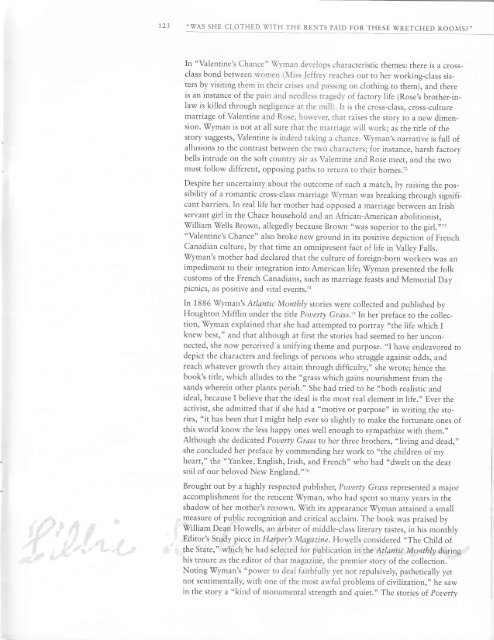Untitled - Rhode Island Historical Society
Untitled - Rhode Island Historical Society
Untitled - Rhode Island Historical Society
Create successful ePaper yourself
Turn your PDF publications into a flip-book with our unique Google optimized e-Paper software.
I23 "WAS SHE CLOTHED \(/ITH THE RENTS PAID FOR THESE \TRETCHED ROOMS?"<br />
In "Valentine's Chance " Wr.man develops characteristic themes: there is a cross-<br />
class bond between women 1-\Iiss Jeffrev reaches out to her working-class sisters<br />
by visiting them in their crises and passing on clothing to them), and there<br />
is an instance of the pain and needless tragedy of factory life (Rose's brother-inlaw<br />
is killed through negligence at the mill). It is the cross-class, cross-culture<br />
marriage of valentine and Rose, ho*,er,er, that raises the story to a new dimension.<br />
\flyman is not at all sure thar the marriage rvill work; as the title of the<br />
story suggests, Valentine is indeed taking a chance. Wyman's narrarive is full of<br />
allusions to the contrast between the two characters; for instance, harsh factory<br />
bells intrude on the soft country air as valentine and Rose meet, and the two<br />
must follow different, opposing paths to rerurn to their homes.72<br />
Despite her uncertainty about the outcome of such a match, by raising the possibility<br />
of a romantic cross-class marriage \7yman was breaking through significant<br />
barriers. In real life her mother had opposed a marriage between an Irish<br />
servant girl in the Chace household and an African-American abolitionist,<br />
wifiiam N7ells Brown, allegedly because Brown "was superior to the girl."u:<br />
"valentine's chance" also broke new ground in its positive depiction of French<br />
canadian culture, by that time an omnipresent fact of life in valley Falls.<br />
\fyman's mother had declared that the culture of foreign-born workers was an<br />
impediment to their integration into American life; rfyman presenred the folk<br />
customs of the French Canadians, such as marriage feasts and Memorial Day<br />
picnics, as positive and vital events.Ta<br />
In 1 8 8 6 \fyman's Atlantic Monthly stories were collected and published by<br />
Houghton Mifflin under the title Pouerty GrAss." In her preface to the collection,-wyman<br />
explained that she had attempted to portray "the life which I<br />
knew best," and that although at first the stories had seemed to her unconnected,<br />
she now perceived a unifying theme and purpose. "I have endeavored to<br />
depict the characters and feelings of persons who struggle against odds, and<br />
reach whatever growth they attain through difficulty," she wrote; hence the<br />
book's title, which alludes ro the "grass which gains nourishment from the<br />
sands wherein other plants perish." She had tried to be "both realistic and<br />
ideal, because I believe that the ideal is the most real elemenr in life." Ever the<br />
activist, she admitted that if she had a "motive or purpose" in writing the stories,<br />
"it has been that I might help ever so slightly to make the fortunate ones of<br />
this world know the less happy ones well enough to sympathize with them."<br />
Although she dedicated Pouerty Grass to her three brothers, "living and dead,"<br />
she concluded her preface by commending her work to "the children of my<br />
heart," the "Yankee, English, Irish, and French" who had "dwelt on the dear<br />
soil of our beloved New England."Te<br />
Brought out by a highly respected publisher, Pouerty Grass represented a major<br />
accomplishment for the reticent'Wyman, who had spent so many years in the<br />
shadow of her mother's renown. \7ith its appearance \7yman attained a small<br />
measure of public recognition and crirical acclaim. The book was praised by<br />
william Dean Howells, an arbiter of middle-class literary tastes, in his monthly<br />
Editor's Study piece in Harper's Magazine. Howells considered "The child of<br />
the state." which he had selected for publication in the Atlantic Monthly during<br />
his renure as the ediror of thar magazine. rhe premier story of the colleciion.<br />
Noting \7yman's "power to deal faithfully yet not repulsively, pathetically yet<br />
not sentimentally, with one of the most awful problems of civilization," he saw<br />
in the story a "kind of monumental strength and quiet." The stories of pouerty











